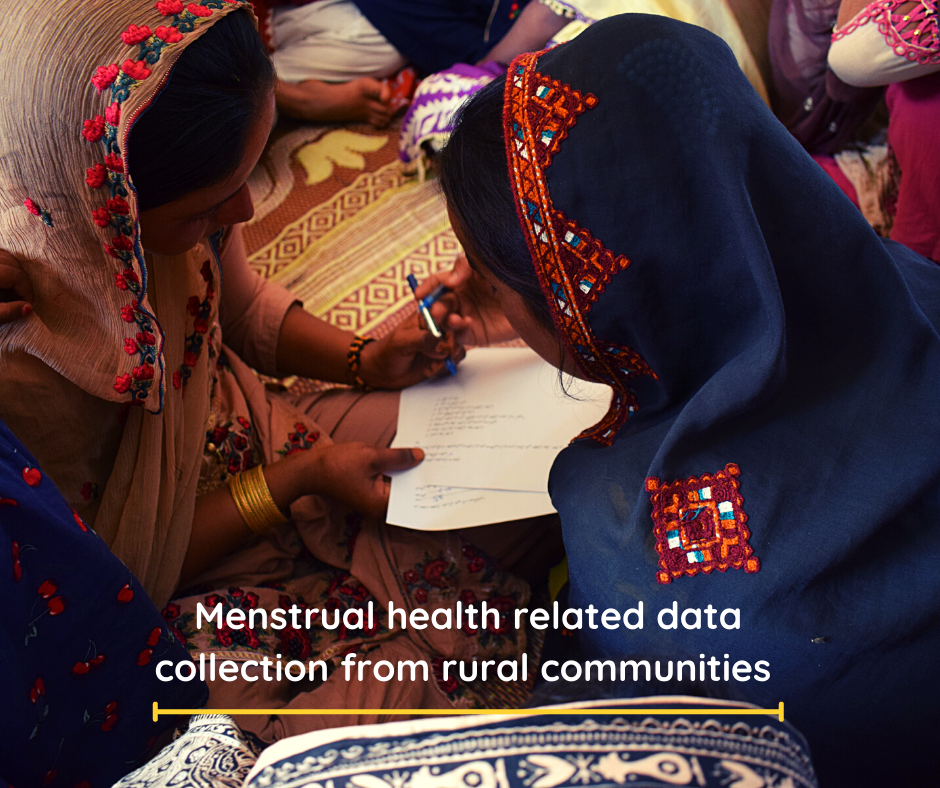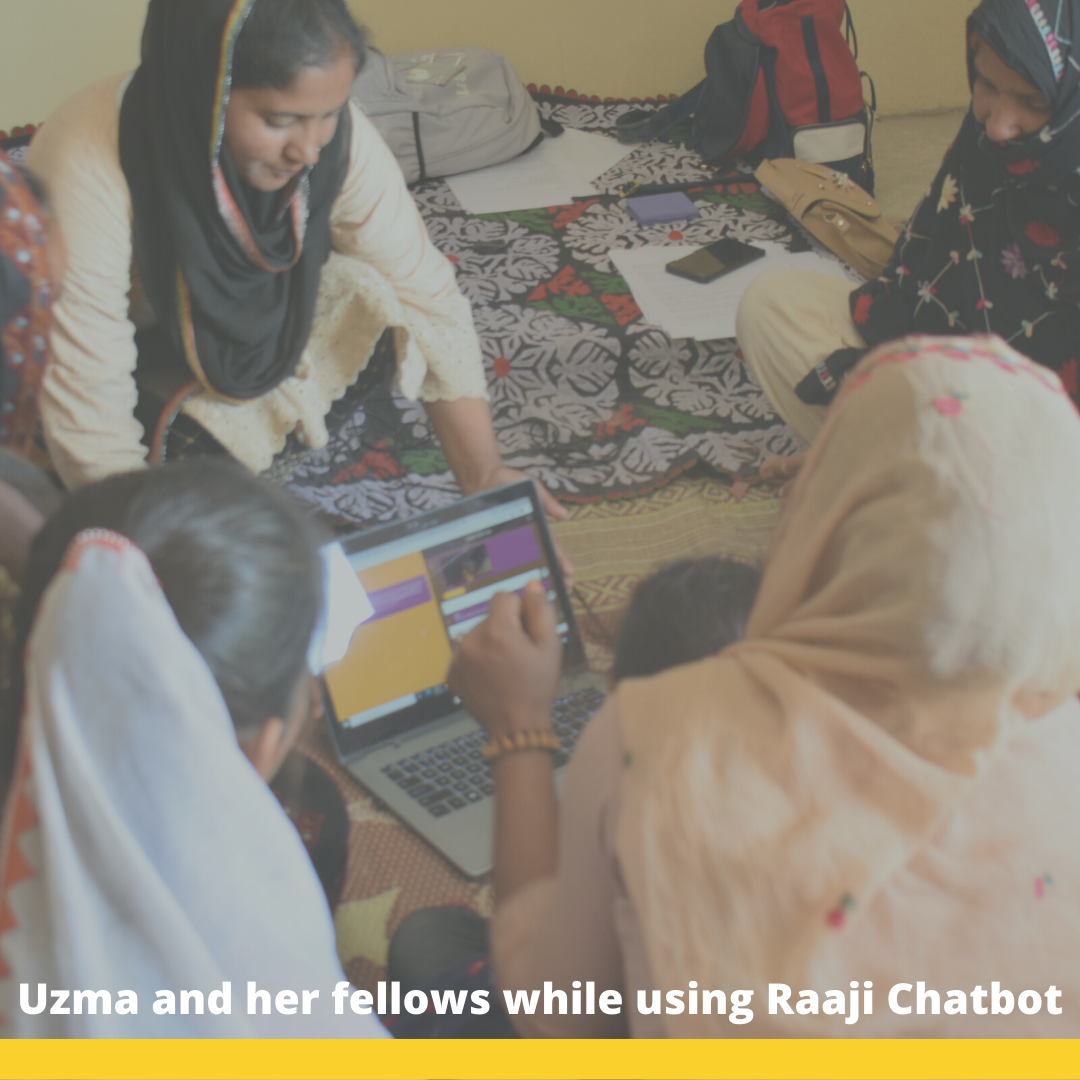Raaji collaborates with SRSO to foster menstrual health in rural communities
With the support of the EU-funded SUCCESS Programme and its implementing partner Sindh Rural Support Organization (SRSO), we arrived in the village of Dundh, district Larkana, Sindh, to promote menstrual health in rural communities. Sindh Rural Support Organization (SRSO) was established in July 2003 with an endowment from the government of Sindh. As a result, the Sindh Rural Support Organization has an 18-years long and successful journey impacting 1,269,274 households organized into communities in various villages across rural Sindh.
Leadership joins Aurat Raaj
We had been invited to visit and meet the rural communities by (Mr. Jamal Mustafa Shoro, Team Leader SUCCESS at SRSO), Ms. Samina Barkat Ali (Gender Focal Person at SRSO), Ms. Uroosa Khatti (Manager Liaison and Coordination at SRSO), Mr. Abdul Mannan Chachar (Monitoring and Evaluation Manager) and other field staff of SRSO.
The village of Dundh
Being close to the historic site of Moen-Jo-Daro, the people who live in Dundh have a rich cultural heritage, which is reflected in their embroidery work. We landed at Uzma Begum’s home which serves as a hub for certain rural entrepreneurs who jointly formed a Business Development Group named ‘Sughar’ (Skilled) in village Dundh, Larkana.
Uzma is a graduate and she has expertise in appliqué embroidery that her mother passed on to her. She turns out to be a talented and emerging businesswoman along with her 13 participants of the Business Development Group formed under SUCCESS in her village.
Menstrual Awareness Session
We started our menstruation exercise with nearly 15 rural women by presenting a scenario of a young girl experiencing her menarche. Meanwhile, we also discussed our visit’s purpose, which was to promote menstrual health with them and ethical concerns related to their consent. Rural women began introducing themselves and sharing their stories of having their first menstrual cycles.
We also discovered several menstruation-related misconceptions in which the commonly practiced was to avoid taking a shower, skipping school, and feeling embarrassed during these days. Some of the participants agreed with the myths, stating that showering after three days could be beneficial for menstruation and health.
Assessing Knowledge gaps
To get more insights of the community about menstrual current needs, information access, attitudes, and practices, we distributed a pre-measurement survey in the local language – Sindhi. The facilitators including Communications Officer from SRSO-SUCCESS and Uzma assisted the participants in comprehending the questionnaire as well as data entry and collection. Among the participants, few were literate that helped others to fill out the survey. They said they've never had the opportunity to discuss their menstrual issues before. During this exercise, they were explicitly allowed to express their emotions, opinions, and difficulties.
Following our technology-driven curriculum, we also played an animated video to introduce Raaji, an animated character who faced society's dark realities at her early age, left her home and lived in the hostel where she got her first periods. The participants shared their views on Raaji’s episode and linked it with their existing problems of menstruation.
Digital Apprehension
We also found that some of the participants specifically those who were not literate had fear of technology. We tried to lessen their anxiety by another activity. Each participant was invited to try Raaji Chatbot, which allowed them to touch the screen and have Raaji respond in Urdu language. The activity helped them to be familiar with digitalization.
Uzma and her community women already had smartphones and social media accounts. We were more surprised to know that Uzma had attended a 1-day training on digitalization by SRSO. It's because of Uzma's dedication and expertise that her coworkers were able to earn through an online market during COVID-19 when the physical markets were closed. She says, “The majority of people in my circle use their cell phones for texting, making phone calls, and using Facebook. However, I'm using Whatsapp app to grow my clientele and assist my fellow participants.”
Uzma thinks through digitalization, she can bring awareness to her area. She also showed her stunning appliqué work to us. Uzma and her fellow women could become menstrual health ambassadors in their communities, to educate others about the basics of menstruation and remove the stigma associated with it.
Learning points:
Creating ambassadors can help us scale the menstrual health program in small villages where it is hard for Aurat Raaj to reach regularly.
Considering their existing handicraft and embroidery skillset, the participants could potentially play a role in creating menstrual products in the future.
The rural participants are motivated to become part of the SRSO-Aura Raaj partnership menstrual health learning sessions
The participants found digital engagement through Raaji and her narrative interesting to resolve menstruation-related issues.
One of the Community Resource Persons shared that not only girls but also boys should be told about menstruation before marrying as it affects post-marriage life.
Reporting contributions by Ms. Anjum Malik, SUCCESS Communications Officer RSPN and Documentation & Reporting Officer SRSO Ms. Shaiwana Pathan.
.png)


